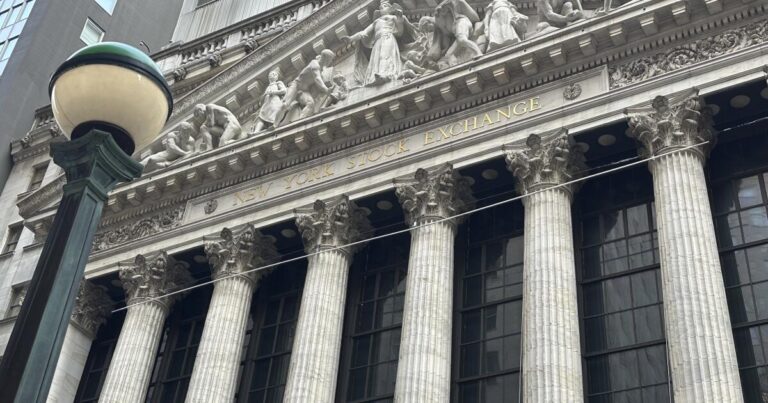Most U.S. stocks rose on Thursday as the latest inflation figures strengthened Wall Street’s view that interest rate cuts could come as early as September.
Four of the five stocks in the Standard & Poor’s 500 Index rose, but their resilience was masked by declines in Nvidia, Microsoft and several other big names. The giants have been the market’s biggest winners amid a frenzy around artificial intelligence technology, prompting critics to say their shares are too expensive and helping to drag the S&P 500 down 0.9% from an all-time high it hit a day earlier.
The decline in big tech stocks also pushed the Nasdaq Composite Index down 2% from its all-time high. The drop snapped a seven-day winning streak for both the S&P 500 and the Nasdaq Composite. The Dow Jones Industrial Average, which is lightly weighted by tech stocks, rose 32 points, or 0.1%.
The direction was clearly up for most Wall Street stocks, especially housing companies, property owners and others who stand to benefit from easing interest rates. SBA Communications, which owns towers and other facilities used in wireless communications infrastructure, rose 7.5%, the biggest gainer in the S&P 500 index.
Smaller companies, which had lagged the market giants for some time, also fared well, with the Russell 2000 index of small and mid-sized stocks rising 3.6%, a decisive lead for the market. Some market watchers see the change as encouraging, saying it’s healthier to have more stocks participating in a bull market, rather than a few dominant 1%.
The day was even stronger in the bond market, where yields fell sharply as traders grew more confident that the Federal Reserve will soon start cutting its key interest rate, after remaining stuck at the highest level in more than two decades for nearly a year.
Wall Street wants to cut interest rates to ease pressures that have built up in the economy as it has become too expensive to borrow on credit cards to buy homes, cars and other items. But Fed officials have said they want to see “better data” on inflation before taking any action.
Wall Street took that as precisely what a report on Thursday showed that prices for gasoline, cars and other goods bought by U.S. consumers rose more slowly than expected in June from a year earlier.
“In a word, it’s crucial,” said Lindsay Rosner, head of multi-sector investing at Goldman Sachs Asset Management. “There have been three inflation readings between this morning and the September Fed meeting, and today’s reading was crucial in giving the Fed confidence that inflation is still trending in the right direction.”
Treasury yields immediately fell sharply after the report was released. The yield on the 10-year Treasury note fell to 4.20% from 4.28% at Wednesday’s close, down from 4.70% in April. That’s a big move for the bond market, and it’s set to send stock prices soaring.
Falling yields have helped real estate owners and utility companies take the lead in the stock market, as lower bond yields make the relatively high dividends of these stocks more attractive to income-seeking investors.
S&P 500 real estate investment trusts, which include SBA Communications, rose 2.7%, the biggest gain among the index’s 11 sectors, followed by utilities, which rose 1.8%.
Homebuilders also fared well, buoyed by hopes that lower mortgage rates will spur the industry. D.R. Horton rose 7.3%, and Lennar rose 6.9%, the biggest gains in the S&P 500. Mohawk Industries, which makes residential flooring products, rose 7.4%.
Hopes of upcoming interest rate cuts, as well as hopes of big earnings gains, have helped propel U.S. stocks to record highs. Analysts expect S&P 500 companies to post their best combined growth in more than two years this coming earnings season, according to FactSet, but it’s off to a mixed start.
Delta Air Lines fell 4% after reporting slightly weaker spring revenue and profit than analysts had expected. The airline said summer travel demand was strong but also lowered its profit outlook for the current quarter than Wall Street had expected.
Electric-car maker Tesla Inc. fell 8.4%, shedding some of the gains from a sell-off that had seen its stock rise 44% in 11 days. The company and all other stocks in a group that has come to be known as the “Magnificent Seven” fell on the day.
Alphabet, Amazon, Apple, Meta Platforms, Microsoft, Nvidia and Tesla have driven the majority of the S&P 500’s returns for over a year as these companies’ financial performance has appeared to rise regardless of the strength of the economy or interest rates.
In the end, the S&P 500 fell 49.37 points to 5,584.54, the Dow rose 32.39 points to 39,753.75 and the Nasdaq Composite lost 364.04 points to 18,283.41.
Overseas, Japan’s Nikkei rose 0.9% to hit another record high, while indexes in many other Asian and European countries also fared well.
Choi is a contributor to The Associated Press.

